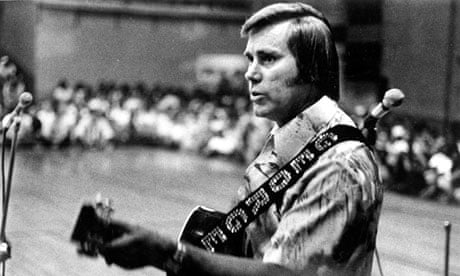George Jones, who has died aged 81, was country music's most stylish and emotional singer. Less well-known outside the genre than his one-time wife Tammy Wynette, he had one of the finest voices of the 20th century. He was the king of honky-tonk, the raw electric country style, and was in a direct line from Ernest Tubb and Hank Williams.
The youngest of eight children, Jones was born in Saratoga, east Texas, in a region known as Big Thicket, a wooded oil-rich backwater on the edge of the Louisiana bayous. His father, also George, was a truck driver and oil worker who took solace in his guitar and the bottle. His mother, Clara, found comfort in music, sobriety and fundamentalist religion.
The young George absorbed all his parents' influences. He sang at church, got his first guitar at nine and was busking on the streets of Beaumont by the age of 11. He married his first wife, Dorothy, when he was 19; they divorced within a year and he joined the marines soon after.
He was in thrall to Roy Acuff and Williams; the latter told Jones not to copy him but to find his own voice. Jones listened but like Williams headed straight for the honky-tonk. Jones's raw emotions fought through knots in his stomach and twists in his heart. Like Jerry Lee Lewis, the clash between God and the devil, drink and the divine, was the touchstone for his talent.
Shaping his style, Jones became a master of melisma, a gospel technique that involved the stretching of a syllable across several musical notes that were decorated and feathered at their ends for maximum emotional impact. His voice started with an open-throated wail, then clamped down with a keening tug as he rose into a cry, then swooped down into his rich baritone. The voice pines, the tension is never released and the emotion remains undiluted.
Out of the marines, Jones had his first country hit in 1955 with Why Baby Why, released on the Starday label. While Elvis Presley and rock'n'roll emerged, Jones plunged deeper into hard country. He went on to record for Mercury, United Artists, Musicor and Epic and enjoyed a long string of hits including White Lightning (1959), Tender Years (1961), She Thinks I Still Care (1962), Walk Through This World with Me (1967) and The Grand Tour (1974), all of which reached No 1 in the US country charts.
When Jones released I'll Share My World with You in 1969, his fans knew it was Wynette he was singing about. She appeared on the cover of the album of the same name. Jones, after a divorce from his second wife, Shirley, married Wynette in 1969. Jones and Wynette were Mr and Mrs Country Music and their life together became a country soap opera, with every bottle drunk and thrown, every twist and turn in the road documented in song. Their divorce was marked by another gut-wrenching single, Golden Ring, released in 1976 – the year after they divorced. They christened their daughter Tamala Georgette; she later became the country singer Georgette Jones.
After their divorce, Wynette and Jones continued to tour and record together. Jones survived alcohol and cocaine abuse in the 1970s to enjoy a renaissance the following decade with hits such as the Grammy award-winning He Stopped Loving Her Today (1980), Still Doin' Time (1981) and I Always Get Lucky with You (1983). He sang of loss and denial, encyclopedically detailing alcoholism on songs such as the 1981 single If Drinkin' Don't Kill Me (Her Memory Will). "With the blood from my body," he sang in that song, "I could start my own still." His intense, heartbreaking honky-tonk still rang true through the subsequent decades when country music became "new country" and went limp.
Known as both Possum and No Show Jones, he could disappear before a show and be found two weeks later in a motel room with a bottle of whisky. His life stabilised after he married Nancy Sepulvado in 1983 and she became his manager. Even so, in 1999 – the year he won a Grammy for Choices – after being sober for 13 years, he got drunk and smashed his car into a bridge. He entered rehab and proclaimed, "The Lord still has work for me to do." He continued to tour and record and, in 2012, won a Grammy for lifetime achievement. "Who's gonna fill their shoes?" he sang on his 1985 single of the same name. The answer is no one.
As well as his daughter with Wynette, Jones had a daughter, Susan, from his first marriage and two sons, Jeffrey and Brian, from his second marriage. He is survived by Nancy and his children.

Comments (…)
Sign in or create your Guardian account to join the discussion